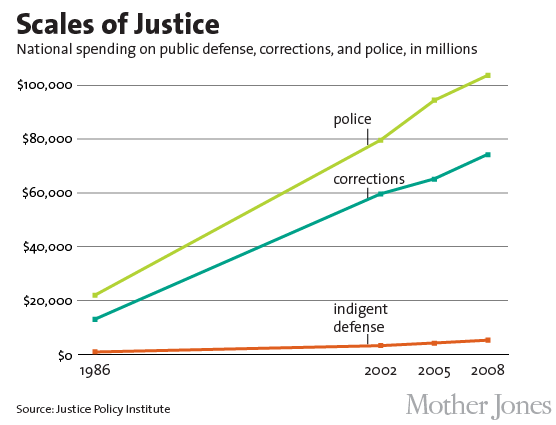
Photo Courtesy of Mother Jones
The Washington Supreme Court issued an Order on caseload standards the Court has adopted for indigent criminal defense services. Justices unanimously agreed to set the new statewide standards, which call for public defenders to handle a maximum of 47 felony cases or 120 misdemeanor cases in a year, depending on one’s primary area of practice. The current thresholds are 150 felonies and 400 misdemeanors.
The Order is a summary explanation of the new caseload standards, which permit full implementation to be achieved over a period of time. The revised caseload standards will be integrated into court rules once the Court’s review of all of the proposed standards is complete.
The Order includes three key provisions:
- Specific caseload standards for different types of cases, which should be accomplished as soon as “reasonably possible,” and allowing for a phased approach to implementation;
- Declining to mandate a method for case counting and weighting, however, encouraging the use of case weighting; and
- Requiring evaluation of the progress and impacts of implementation three years after the effective date of the new caseload standards.
WHY DID THE WA SUPREME COURT MAKE RULINGS ON PUBLIC DEFENSE CASELOADS?
In 2024, Revisions to Washington public defense standards were recommended by the Washington State Bar Association (WSBA) and its Council on Public Defense (CPD). This happened after two years of intense study of the growing crisis involving steep declines in the number of public defense attorneys due to heavy caseloads and other factors, both in Washington and nationally.
WHAT DID THE WA SUPREME COURT DECIDE?
The Supreme Court’s adopted standards for indigent defense included lowering the maximum caseloads for public defense attorneys, revising some qualification requirements for public defense attorneys, and setting minimum support staffing requirements for public defense attorneys and offices.
While the Court has not completed its full review of recommended changes to public defense standards, “in advance of a full decision on all parts of the CPD’s proposal, we provide this summary communication of the Court’s conclusions on caseloads,” according to the Order. “The reality is that many aspects of indigent criminal defense services vary by structure and location, so the Court is adopting an approach which accommodates that diversity while fostering real and meaningful reductions in caseloads as soon as possible, where necessary.”
My opinion? Good decision. Studies show Public Defenders Are dangerously overworked. Please contact my office if you, a friend or family member are charged with a crime. Hiring an effective and competent defense attorney is the first and best step toward justice.








